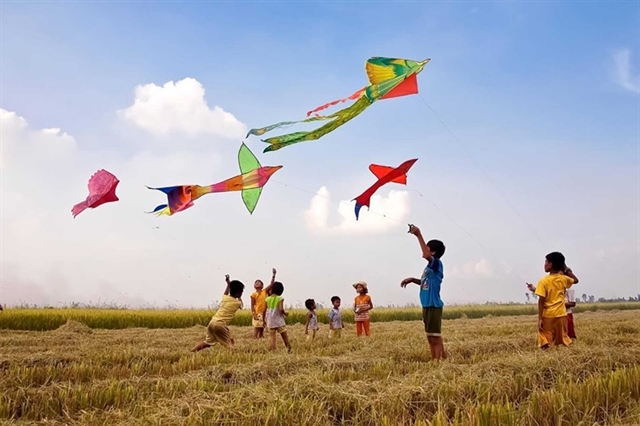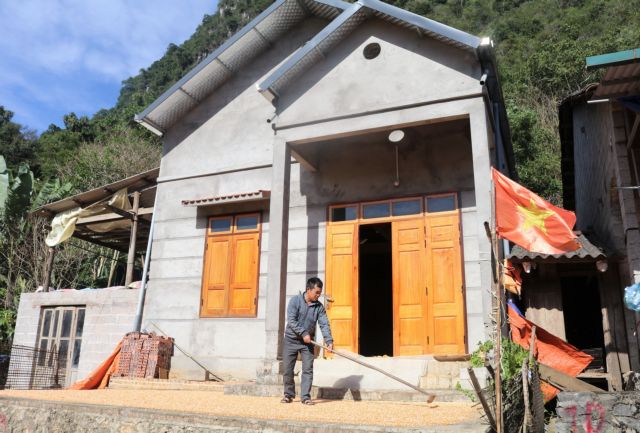 Op-Ed
Op-Ed

 |
| Nông Hoàng Quỳnh, a farmer in the mountainous province of Cao Bằng, has been provided with a new home thanks to the government's initiative to replace dilapidated houses. — VNA/VNS Photo |
HÀ NỘI — Việt Nam has made impressive strides in advancing human rights and sustainable development, drawing recognition at home and abroad.
With a focus on improving the quality of life for its people, the country’s achievements reflect its long-standing commitment to inclusivity and progress.
Việt Nam’s human rights philosophy, as Prime Minister Phạm Minh Chính put it, centres around ensuring all its citizens enjoy a life of dignity, peace and prosperity, and have the opportunity to reach their full potential.
Guided by the philosophy, the country’s human rights efforts have touched all aspects of life, from economic growth to social welfare.
Between 2019 and 2024, its GDP per capita grew by 25 per cent, while the national poverty rate decreased by 1.5 per cent annually.
By late 2024, only 1.93 per cent of households nationwide were considered poor, thanks to targeted programmes to alleviate poverty and improve living standards.
Efforts to build social housing have mobilised over VNĐ6 trillion (US$236 million), replacing inadequate homes with safe and comfortable living spaces.
The country has also climbed to 54th out of 166 countries in the Global Sustainable Development Index, reflecting steady progress in balancing economic and social priorities.
Việt Nam’s achievements have not gone unnoticed.
Emeritus Professor Carl Thayer from the Australian Defence Force Academy praised the country’s robust economic growth and its success in reducing poverty. Annual increases in wages and pensions were also highlighted as key policies enhancing the lives of Vietnamese workers.
Professor Reena Marwah from the University of Delhi commended Việt Nam for its remarkable economic transformation. Per capita income, which once hovered around $200, has now exceeded $4,000.
Improvements in healthcare and universal health insurance coverage, now reaching 94.1 per cent, demonstrate the country’s commitment to social well-being.
Sharing with Việt Nam News on December 10, Pauline Tamesis, the UN Resident Coordinator in Việt Nam, pointed out the country’s efforts in justice, equality and inclusion in honour of International Human Rights Day.
She noted how human rights shape policies that improve access to education, healthcare and legal protection, especially for vulnerable groups.
Tamesis applauded Việt Nam’s inclusive reforms, such as amendments to the Employment Law to support people with disabilities and the expansion of Family and Juvenile Courts, which prioritise rehabilitation over punishment for children in conflict with the law.
Việt Nam’s recognition of LGBTIQ+ rights, including destigmatising sexual orientation and gender identity, has paved the way for non-discriminatory healthcare services.
Tamesis also highlighted Việt Nam’s commitment to addressing climate change, noting the country’s ambitious goal of achieving net-zero emissions by 2050 and its efforts to support communities affected by natural disasters.
Việt Nam has emerged as an active and respected member of the United Nations Human Rights Council for the 2023–2025 term. At the Council’s recent 57th session, the country led initiatives promoting equitable access to vaccination and contributed to ASEAN statements on human rights.
Its human rights record, especially in areas like gender equality, public health and education, has received widespread recognition. Programmes addressing the needs of ethnic minorities and the LGBTIQ+ community further underscore the country’s inclusive approach to development.
World Peace Council's Executive Secretary Iraklis Tsavdaridis and UN Development Programme’s resident representative in Việt Nam Ramla Khalidi agree that the country’s progress reflects its focus on sustainable development and human-centered policies.
As the country prepares to celebrate significant milestones in 2025, its achievements in reducing poverty and enhancing quality of life remain a source of national pride.
In a letter to a national symposium on human rights in October, Party General Secretary Tô Lâm reaffirmed Việt Nam’s commitment to putting people at the centre of development.
"A steadfast commitment to human rights is essential for building a strong and united nation." he wrote.
Việt Nam’s journey toward ensuring human rights has made it a global model of resilience and inclusivity. Pauline Tamesis summed it up best: building a brighter, more equitable future requires collective efforts from all sectors of society.
With its focus on progress and inclusion, Việt Nam is well-positioned to continue improving the lives of its people while inspiring others worldwide. — VNS




